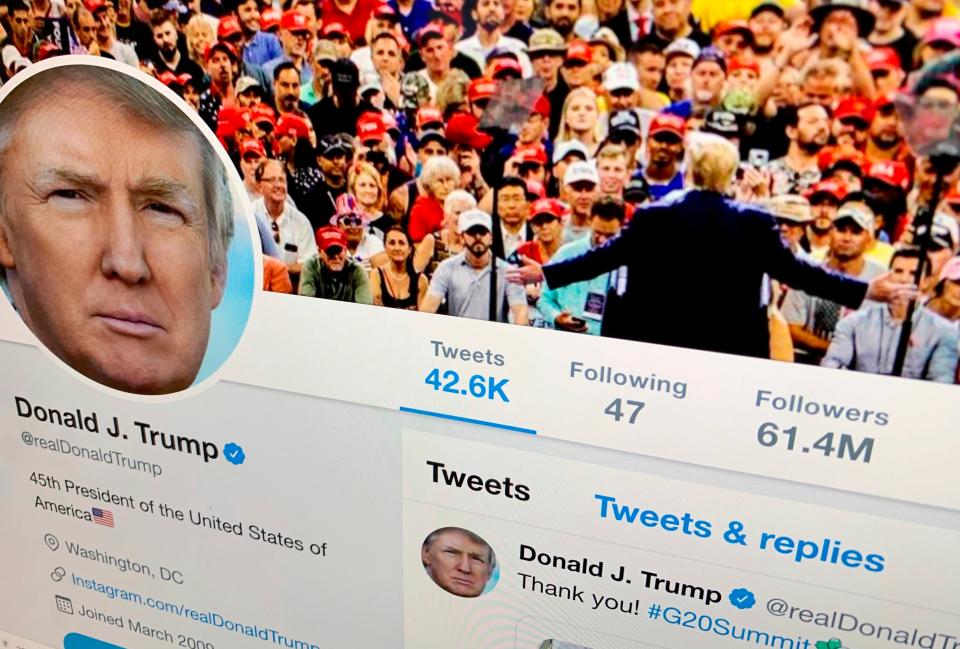Trump asks Supreme Court to let him block critics from following him on Twitter
WASHINGTON – President Donald Trump is taking his effort to block his critics on Twitter to the Supreme Court.
The Justice Department on Thursday asked the high court to review a federal appeals court ruling that found the president's practice of blocking critics violates the First Amendment.
Trump, who now has more than 85 million Twitter followers, prompted the court battle in 2017 by blocking some of the social media company's users from following his Twitter account. Seven of them went to court, charging that he was seeking to "suppress dissent."
A federal district court ruled against the president in 2018, and a panel of the U.S. Court of Appeals for the 2nd Circuit followed suit in 2019. Earlier this year, the full appeals court refused to rehear the case.
“These tweets are published by a public official clothed with the authority of the state using social media as a tool of governance and as an official channel of communication on an interactive public platform,” appeals court Judge Barrington Parker wrote.
Acting Solicitor General Jeffrey Wall told the justices Thursday that Trump's account was created in 2009 when he was a private citizen. Wall said the president has continued to use it for both personal and official pronouncements.

"The president uses his account to speak to the public, not to give members of the public a forum to speak to him and among themselves," Wall said.
"Denying him the power to exclude third parties’ accounts from his personal account – a power that every other owner of a Twitter account possesses – would deter holders of his office from using new technology to efficiently communicate to a broad public audience."
The president tweets regularly at @realDonaldTrump, often multiple times a day. Since establishing the account, he has tweeted more than 54,000 times – an average of about 13 per day. Typical are his rants against opponents, such as one unleashed Wednesday night after Democratic vice presidential nominee Kamala Harris' acceptance speech to the Democratic National Convention.
BUT DIDN’T SHE CALL HIM A RACIST??? DIDN’T SHE SAY HE WAS INCOMPETENT???
— Donald J. Trump (@realDonaldTrump) August 20, 2020
The Justice Department acknowledged that Trump uses the account for government business but said the appeals court failed to understand that blocking followers is his personal decision.
"By ignoring the critical distinction between the president’s (sometimes) official statements on Twitter and his always personal decision to block respondents from his own account, the opinion blurs the line between state action and private conduct," Wall said in asking the Supreme Court to hear the case.
"The result of the court of appeals’ novel ruling will be to jeopardize the ability of public officials – from the president of the United States to a village councilperson – to insulate their social-media accounts from harassment, trolling, or hate speech without invasive judicial oversight."
Typical of the seven Twitter users who brought the case in 2017 was Rebecca Buckwalter of Washington, D.C. After Trump tweeted "Sorry folks, but if I would have relied on the Fake News of CNN, NBC, ABC, CBS washpost or
nytimes, I would have had ZERO chance winning WH,” she replied: “To be fair you didn’t win the WH: Russia won it for you.”
Those blocked from a Twitter account cannot read tweets, respond to them directly, or contribute to the comment threads.
After the 2018 district court ruling, the White House unblocked the seven individuals who brought the case, along with others blocked because of their viewpoints. But it did not unblock those who could not specify the tweet that caused Trump to block them, or those blocked before he became president.
“This case stands for a principle that is fundamental to our democracy and basically synonymous with the First Amendment: government officials can’t exclude people from public forums simply because they disagree with their political views,” said Jameel Jaffer, executive director of the Knight First Amendment Institute at Columbia University, which represents the plaintiffs.
The Supreme Court likely will decide this fall whether to hear the case next year.
This article originally appeared on USA TODAY: Donald Trump asks Supreme Court to let him block critics on Twitter

